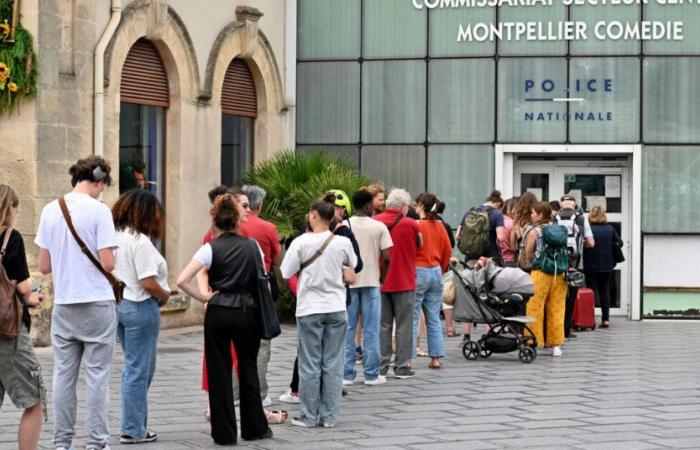More than two million people have registered as proxies for the upcoming legislative elections. The phenomenon, which tends to grow, raises questions to the extent that it partly bypasses the secret and individual dimension of voting. But doesn’t it also make it possible to shape an interesting democratic bond, based on trust or the sharing of values?
Summer holidays, surprise effect of these elections: With this election, more than for others, proxy voting has become the only solution for more than a million people. The principle is simple – the person who cannot go to their polling station (the proxy) gives another individual (the principal) the power to go and vote in their place. In order to avoid the risk of fraud, the procedure is regulated. Each citizen can only take one proxy per ballot (in this case, one for each round of elections). The process can be done online if the proxy has a digital identity, or by going to a police station. Although this process is increasingly popular – particularly during high-stakes elections and those taking place during the holidays like the one we are about to experience – the phenomenon remains very little studied. However, it is rich in lessons and could represent a laboratory for studying the changes in our democracy.
Between civics and activism
One of the most interesting aspects of proxy voting is that it is the subject of a transaction between two citizens based exclusively on trust. Indeed, the proxy who entrusts his vote will never be able to verify that it has been respected. The proxy therefore introduces a particular human relationship, likely to create ethical dilemmas, typically of the order of “should I take the voice of someone who votes for a candidate contrary to my values?” The underlying question is the following: is a proxy vote an activist gesture? In this case, I only accept proxies that are in agreement with my vote. Or is it a purely civic act? Here, my goal is to allow someone to make their voice heard, even if I do not agree with them.
In the current period, both directions are considered. On one side, there are NGOs that claim to be neutral, such as A Voted, which seek to connect citizens of all persuasions in order to allow as many people as possible to exercise their power and civic duty. And on the other, the three parties involved – the New Popular Front, Ensemble pour la République and the National Rally – who encourage people to vote in their favour on their respective websites. Thus, voting in favour is caught up in two fundamental, apparently contradictory issues: making democracy live in general and making a particular party win.
Stimulating democracy
But are the two aspects really so contradictory? Bringing a party to life, arousing emulation for a social project, isn’t that also allowing everyone to express their voice? And conversely, informing someone about the methods and mechanisms for making a proxy, keeping them informed of their civil rights, isn’t that making it possible for them to create a political opinion? In any case, democracy comes out the winner from this exchange, to the extent that voters are informed of their rights.
Whether one favors one or the other path – that of activism or civic-mindedness – the proxy process introduces a dialogue. The principal can, for example, start discussing politics with his neighbor, his family, or the stranger who has agreed to take his power of attorney on a dedicated site. Once the transaction between the principal and the mandated is completed, when it has been decided that one of them will represent the voice of the other, a new bond is created, which is of the order of democratic trust. We choose to rely on another, to depend on him to make our voice heard. These relationships of trust between individuals compose, according to the German philosopher Georg Simmel (1858-1918) the cement of our democracy. “There is society where there is reciprocal action of several individuals”he writes in Sociology. Studies on forms of socialization. Ces “minimal relations between human beings” as well as “all […] the conversations and silences, the manifestations of common or opposing interests that occur constantly” according to him “the strength of the social fabric”.
The proxy therefore replays at the citizen level what takes place in society: each citizen depends on others to exist and make their voice heard. This voting system, because it is based on a form of civic altruism, is also a way of fighting, for example, against validism, which consists of seeing and organizing collective and civic life only from the point of view of a valid person. In this case, the transfer of power allows the elderly and sick to express their voice, even if they are not able to travel.
A desacralization of the vote
But in a context where every vote counts, where democracy is tense, where the people are subject to a decisive choice capable of changing the form of government, the procedure can be worrying. Shouldn’t the vote be secret and strictly individual? More broadly, the materiality of the vote and its ritual dimension – the movement, the passage behind the curtain, the fact of choosing a name, slipping your ballot into the envelope and hearing the famous “voted” – do not count not to give full meaning to this democratic gesture?
The proxy has the effect of short-circuiting the moment of choice behind the ballot box. But the solitude of the voting booth is beneficial because it protects the citizen from possible violence from opponents and pressure. It can also limit what is called “family voting”, which consists, for a member of the family acting as an authority figure, of putting pressure on the other members. Beyond threats, secrecy also avoids voting motivations that would be based on the pure desire to be loved or appreciated. « Since voting is anonymous in our societies, the desire for approval from others does not work [comme motivation] », notes in this regard the Norwegian philosopher Jon Elster.
Voting behind a curtain is therefore a protection but also the guarantee of a form of seriousness.. In the republic, this ritual is crowned with a form of sacredness whose echoes are found in theand Social Contract of Rousseau. The philosopher believes that at the moment I exercise this power, I make people speak “the general will” in me, that is to say, “the common good”. Voting (for a law, because the philosopher was against representative democracy) is therefore a precious and important act that should not be delegated. Submitting one’s vote to others in this case amounts to giving up one’s sovereignty. If everyone does the same, the whole of democracy collapses.
An “above ground” ballot
The proxy can also have the effect of “deterritorializing” the vote. When a person votes for the legislative elections, they give their voice to a member of parliament who will be in charge of defending the region they know, because they live there. When you no longer live in a place, are you able to choose the representatives of this region in an informed manner? Concretely, the journey that leads to the voting booth, which takes us through schools, hospitals and all public places, can in itself be a voting orientation. When I make a proxy, I literally miss this path(ement).
The power of attorney therefore risks making the exercise of civic power totally abstract. When I feel that another person can exercise my power in my place, I disembodied my power. I teleport through him into the voting booth, ignoring the laws of matter. This is what is explained very well Bourdieu in his General sociologywhich criticizes our tendency to “forget that social agents have a body”. There is, he says, “lots of things that social agents would like to do but which, having a body, they cannot do. For example, you cannot be everywhere at the same time, at the oven and the mill, in the National Assembly and in your constituency. […] There are things that cannot be delegated. To exercise any power – whether you are a citizen or a deputy – you must be anchored, in contact with the population, established in a territory. It is difficult to make heard a voice that does not emanate from us but that we have transferred to a body other than ours – which executes our order without embodying it in the first person.
Ultimately, the problem is not so much the power of attorney as how this transfer takes place. It can be done through discussion, dialogue, connection to others and to the territory. Therefore, the transfer of power is not an abandonment of popular sovereignty but on the contrary a stimulant for democracy, which allows citizens to be informed and to discuss among themselves. But the proxy, like voting in general, can also be established in a totally abstract, disembodied way, as a procedure devoid of meaning. The transfer of power then functions as a dispensation, Bourdieu tells us. It spares citizens “to care in the first person”The question of power of attorney allows in fine to think more broadly about the meaning of the vote: if this gesture seems meaningless and no longer concerns concern for others and the common good, perhaps it is because democracy, the power of the people, cannot not be reduced to the simple moment of voting?






